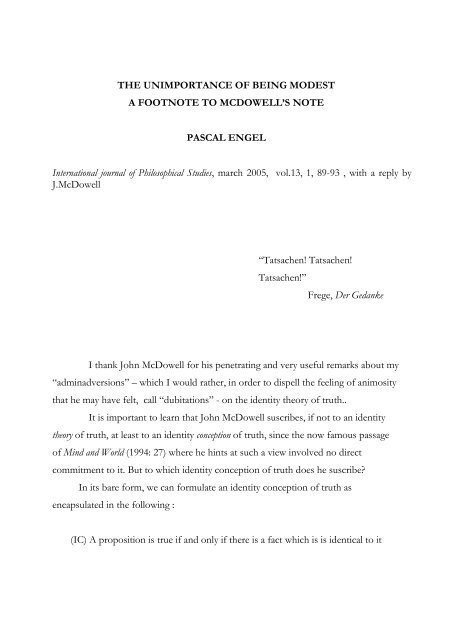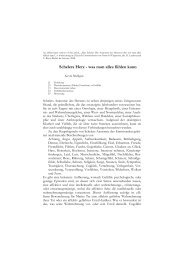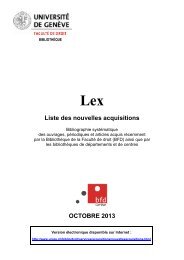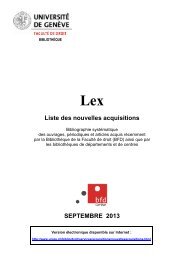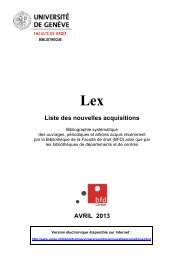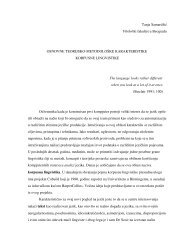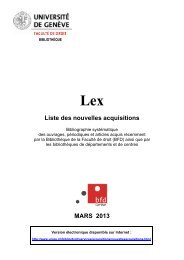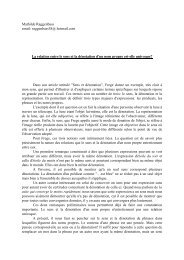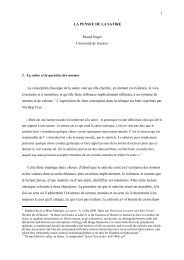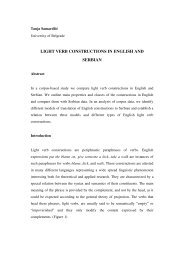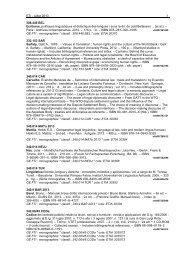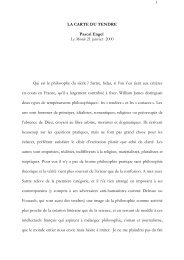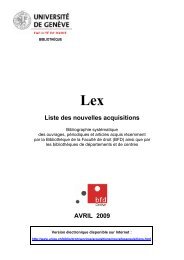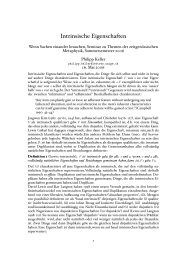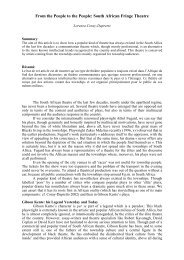2005 Unimportance of being modest A footnote to McDowel
2005 Unimportance of being modest A footnote to McDowel
2005 Unimportance of being modest A footnote to McDowel
You also want an ePaper? Increase the reach of your titles
YUMPU automatically turns print PDFs into web optimized ePapers that Google loves.
THE UNIMPORTANCE OF BEING MODEST<br />
A FOOTNOTE TO MCDOWELL’S NOTE<br />
PASCAL ENGEL<br />
International journal <strong>of</strong> Philosophical Studies, march <strong>2005</strong>, vol.13, 1, 89-93 , with a reply by<br />
J.<strong>McDowel</strong>l<br />
“Tatsachen! Tatsachen!<br />
Tatsachen!”<br />
Frege, Der Gedanke<br />
I thank John <strong>McDowel</strong>l for his penetrating and very useful remarks about my<br />
“adminadversions” – which I would rather, in order <strong>to</strong> dispell the feeling <strong>of</strong> animosity<br />
that he may have felt, call “dubitations” - on the identity theory <strong>of</strong> truth..<br />
It is important <strong>to</strong> learn that John <strong>McDowel</strong>l suscribes, if not <strong>to</strong> an identity<br />
theory <strong>of</strong> truth, at least <strong>to</strong> an identity conception <strong>of</strong> truth, since the now famous passage<br />
<strong>of</strong> Mind and World (1994: 27) where he hints at such a view involved no direct<br />
commitment <strong>to</strong> it. But <strong>to</strong> which identity conception <strong>of</strong> truth does he suscribe?<br />
In its bare form, we can formulate an identity conception <strong>of</strong> truth as<br />
encapsulated in the following :<br />
(IC) A proposition is true if and only if there is a fact which is is identical <strong>to</strong> it
I agree with <strong>McDowel</strong>l that, formulated in this way, IC is a truism, which ill deserves<br />
the name <strong>of</strong> a “theory”. But the fact that a version <strong>of</strong> this view has been held by<br />
philosophers as different from each other as Bradley, Russell, and Moore (Cartwright<br />
1987, Candlish 1989, Baldwin 1991) makes us suspect that more metaphysical flesh<br />
has been put on these bare bones, depending on how one reads the equivalence IC: if<br />
one identifies true propositions with facts in the world one is lead <strong>to</strong> an extreme realist<br />
reading <strong>of</strong> IC, and if one identifies facts in the world <strong>to</strong> true thoughts or judgements<br />
one is lead <strong>to</strong> an extreme idealist reading 1 . Now, as Jennifer Hornsby (1997) as shown,<br />
<strong>to</strong> my mind convincingly, we can also attribute the IC <strong>to</strong> Frege under the following<br />
formulation (which is Frege’s in Der Gedanke):<br />
ICF<br />
A fact is a thought that is true<br />
<strong>McDowel</strong>l considers that it is nothing but a formulation <strong>of</strong> the truism IC. But he<br />
denies that either IC or ICF can be read, as I suggested in my article, from left <strong>to</strong> right<br />
or for right <strong>to</strong> left, i.e in a realist or in idealist sense. He suspects me <strong>of</strong> suscribing <strong>to</strong> a<br />
psychologist reading <strong>of</strong> Frege when I suppose that the idea that the world (the <strong>to</strong>tality<br />
<strong>of</strong> facts) is made up <strong>of</strong> Fregean thoughts can be read in an idealist sense (left <strong>to</strong> right),<br />
or in a realist sense (right <strong>to</strong> left). My mistake, according <strong>to</strong> him, is <strong>to</strong> forget that ICF<br />
can be read in both senses, and that neither one is privileged: if facts are true thoughts,<br />
true thoughts ( “thinkables”, as he prefers <strong>to</strong> call them) are facts, and reality is neither<br />
mind nor world.<br />
I certainly did not mean <strong>to</strong> interpret Frege’s notion <strong>of</strong> sense as something<br />
mental. I just wanted <strong>to</strong> point out that, once we formulate IC in terms <strong>of</strong> ICF, there is<br />
still room for an idealist reading, and that the identification <strong>of</strong> facts with true thoughts<br />
1 According <strong>to</strong> Künne (2003:
is not at all innocent. If, as <strong>McDowel</strong>l says “true thinkables already belong just as<br />
much <strong>to</strong> minds as <strong>to</strong> the world”, Frege’s reaction <strong>of</strong> bewilderment when Russell <strong>to</strong>ld<br />
him that the proposition (the thought) that Mont Blanc is more than 4000 meters<br />
high contains Mont Blanc itself with all its rocks and snows, would be difficult <strong>to</strong><br />
explain. Instead <strong>of</strong> denying that Mont Blanc itself belongs <strong>to</strong> the proposition or<br />
thought, Frege should have accepted this claim, and should have said <strong>to</strong> Russell: “Gut!<br />
if you want it that way, you are free <strong>to</strong> say that the mountain if part <strong>of</strong> the thought”.<br />
On <strong>McDowel</strong>l’s view, Moore must have been wrong when he said :<br />
[Suppose I have the true belief ]that a given tree, which I see, is an oak…The<br />
proposition that the tree is an oak is something which is and equally is whether the<br />
belief is true or false…But..the fact that the tree is an oak is something which is, only<br />
if the belief be true,and hence it is quite plain that…the fact that the tree is an oak is<br />
quite a different thing…from what I believe, when I believe that it is one..” (Moore<br />
1953: 308] 2<br />
There is, however, a third version <strong>of</strong> IC, which elaborates on the truism, and which I<br />
called, perhaps wrongly given the great variety <strong>of</strong> conceptions defended under that<br />
name, “minimalist”. Jennifer Hornsby (1997) has shown that one could extract from<br />
Frege’s remarks in De Gedanke a version <strong>of</strong> the identity theory : a fact is a true thought,<br />
where “thought” is taken as a Fregean sense. Let us call it the On this minimalist, or<br />
perhaps neutralist reading, IC is neutral or indifferent upon whether the equivalence is<br />
read from left <strong>to</strong> right. Hence there is no <strong>McDowel</strong>l<br />
2 Quoted by Künne 2003 : 9-10.
In my article (Engel 2001) I did not mean <strong>to</strong> ascribe <strong>to</strong> <strong>McDowel</strong>l a any direct<br />
commitment <strong>to</strong> an idealist version <strong>of</strong> IC,<br />
Ever since as the identity theory <strong>of</strong> truth made its reapparence on the philosophical<br />
scene it has been clear that there are at least three versions <strong>of</strong> it, depending : (a)<br />
“Realist”: the world consists <strong>of</strong> true propositions (Russell, Moore), (b) “idealist”(<br />
Bradley) : the world consists <strong>of</strong> true judgements, and (c) a version which I would now<br />
call “neutralist”: a true thought is a fact (Frege). On (c) there is no point<br />
3 .When John <strong>McDowel</strong>l seemed <strong>to</strong> suscribe <strong>to</strong> it in a now famous page <strong>of</strong> Mind and<br />
World (1994: 27),<br />
It is important <strong>to</strong> learn that John <strong>McDowel</strong>l suscribes <strong>to</strong> an identity conception <strong>of</strong><br />
truth, since his now famous remark on p.27 <strong>of</strong> the first edition <strong>of</strong> Mind and World, <strong>to</strong><br />
the effect that “there is no gap between thought as such and the world”,<br />
As soon as the identity theory <strong>of</strong> truth made its reapparence on the philosophical<br />
scene (Cartwright 1987, Baldwin 1991, Candlish 1989) it has been clear that there are<br />
at least two <strong>of</strong> it, idealist ( Bradley) and realist (Russell, Moore) 4 .When John <strong>McDowel</strong>l<br />
seemed <strong>to</strong> suscribe <strong>to</strong> it in a now famous page <strong>of</strong> Mind and World (1994: 27),<br />
3 See also the interesting discussion in Künne 2003: 6-12<br />
4 See also the interesting discussion in Künne 2003: 6-12
One <strong>of</strong> the reasons why I expressed scepticism about an identity theory <strong>of</strong> truth was<br />
that it seemed <strong>to</strong> me <strong>to</strong> oscillate between a substantive thesis affirming the identity <strong>of</strong><br />
thought and reality and a <strong>modest</strong> or minimalist thesis which I found quite close <strong>to</strong><br />
other, more well-known, versions <strong>of</strong> minimalism. Now I was well aware that<br />
<strong>McDowel</strong>l’s endorsement <strong>of</strong> an identity theory – or rather conception - <strong>of</strong> truth was<br />
meant <strong>to</strong> be <strong>of</strong> the <strong>modest</strong> or minimalist kind and not <strong>of</strong> the substantive kind which<br />
has been attributed <strong>to</strong> Bradley (on the idealist version <strong>of</strong> the substantive theory) or <strong>to</strong><br />
Russell and Moore (on the realist version). My reason, however, for suspecting that<br />
this claimed <strong>modest</strong>y was less than <strong>modest</strong>, i.e involved more substantive<br />
commitments than the mere “truism” that he thought that spring has begun is true if it is<br />
a fact that spring has begun, is that<br />
1) the identity theory : trivial or not ? Mc Do says it is., but not in<br />
2) my alleged mistake about sense and reference<br />
3) the bipolarity <strong>of</strong> facts<br />
4) <strong>McDowel</strong>l’s coherentism<br />
( I am not simply repeating Michael Friedman’s point: it follows frm my<br />
difficulties with the identity theory) the problem has nothing <strong>to</strong> do with our<br />
cognitive activity<br />
5) Hornsby<br />
I thank John <strong>McDowel</strong>l for his remarks about my “adminadversions” –<br />
which I would rather call “dubitations” - on the identity theory <strong>of</strong> truth..<br />
One <strong>of</strong> the reasons why I expressed scepticism about an identity theory <strong>of</strong><br />
truth was that it seemed <strong>to</strong> me <strong>to</strong> oscillate between a substantive thesis affirming the<br />
identity <strong>of</strong> thought and reality and a <strong>modest</strong> or minimalist thesis which I found quite
close <strong>to</strong> other, more well-known, versions <strong>of</strong> minimalism. Now I was well aware that<br />
<strong>McDowel</strong>l’s endorsement <strong>of</strong> an identity theory – or rather conception - <strong>of</strong> truth was<br />
meant <strong>to</strong> be <strong>of</strong> the <strong>modest</strong> or minimalist kind and not <strong>of</strong> the substantive kind which<br />
has been attributed <strong>to</strong> Bradley (on the idealist version <strong>of</strong> the substantive theory) or <strong>to</strong><br />
Russell and Moore (on the realist version). My reason, however, for suspecting that<br />
this claimed <strong>modest</strong>y was less than <strong>modest</strong>, i.e involved more substantive<br />
commitments than the mere “truism” that he thought that spring has begun is true if it is<br />
a fact that spring has begun, is that<br />
I have recorded my disagreement with Hornsby and <strong>McDowel</strong>l about the identity<br />
theory <strong>of</strong> truth, but I do not at all disagree with her – him – that<br />
found your answer very illuminating, although it<br />
still seems <strong>to</strong> be that if the content <strong>of</strong> perception is bipolar, then this<br />
this clashes with the identity theory <strong>of</strong> truth, for it cannot be a truism<br />
that the content <strong>of</strong> a perception that such and such is the case is identical<br />
<strong>to</strong> a fact: the content might be false. The facts themselves are not bipolar,<br />
but, so <strong>to</strong> say, unipolar.<br />
If one speaks or thinks truly, for instance saying or thinking that Pascal Engel is<br />
unimpressed by the identity theory <strong>of</strong> truth, what one says or thinks is (is nothing but,<br />
is no other than) something that is the case — <strong>to</strong> stay with the same instance, that<br />
Pascal Engel is unimpressed by the identity theory <strong>of</strong> truth. That Pascal Engel is<br />
unimpressed by the identity theory <strong>of</strong> truth is both something I (for one) think and
something that is the case. On perfectly natural ways <strong>of</strong> using talk <strong>of</strong> what one says or<br />
thinks and <strong>of</strong> what is the case, such a remark — which gives expression <strong>to</strong> the core <strong>of</strong><br />
the so-called identity theory — is beyond the bounds <strong>of</strong> possible dispute. It is, as I<br />
said in my (1994), a truism.<br />
The label ‘theory’ seems a poor fit for something that is beyond dispute, and<br />
that is why I have said ‘so-called identity theory’ and left the word ‘theory’ out <strong>of</strong> my<br />
title.<br />
Engel suggests that my <strong>modest</strong>y, in claiming <strong>to</strong> be endorsing no more than a<br />
truism, must be false, if I want the idea <strong>of</strong> something that is the case <strong>to</strong> be the idea <strong>of</strong><br />
an element in the world — if I want the identity conception <strong>to</strong> invoke identity as a<br />
relation between thought and reality. He suggests that this either requires locating<br />
what is the case in Frege’s realm <strong>of</strong> reference, which <strong>of</strong> course makes it impossible <strong>to</strong><br />
identify something that is the case with a thought (in Frege’s sense) that is true, or else<br />
merges the world in<strong>to</strong> the realm <strong>of</strong> sense, which, according <strong>to</strong> Engel, looks like a kind<br />
<strong>of</strong> idealism.<br />
He here repats that true thoughts are facts.<br />
I am not mistaken about Frege’s conception <strong>of</strong> sense, and I do not take it in a<br />
psychologist sense<br />
But this depends on failing <strong>to</strong> take the measure <strong>of</strong> Frege’s conception <strong>of</strong> sense<br />
and reference. A thought, in Frege’s sense, is what one thinks (or says) if one thinks<br />
(or says) something, as opposed <strong>to</strong> the thinking <strong>of</strong> it. That Engel is unimpressed by<br />
the identity theory <strong>of</strong> truth is something any reader <strong>of</strong> his paper is bound <strong>to</strong> think. It<br />
is a Fregean sense, a thinkable. But it, that very same thing, is also something that is<br />
the case, and hence an element in the world, on the perfectly natural conception <strong>of</strong> the<br />
world according <strong>to</strong> which the world is everything that is the case. Its <strong>being</strong> a thinkable<br />
does not imply that it is somehow primarily ‘mental’, and so able <strong>to</strong> be conceived as an
element in the world only on some idealistic construal <strong>of</strong> the world. Engel introduces<br />
the two ‘versions’ <strong>of</strong> the identity theory that he considers, the identity theory <strong>of</strong> facts<br />
and the identity theory <strong>of</strong> thoughts, by distinguishing two directions in which the<br />
identity thesis ‘A true thought is a fact’ could be read. But the question <strong>of</strong> a direction<br />
should not arise. Neither side <strong>of</strong> the identity thesis should be supposed <strong>to</strong> be<br />
intelligible in advance <strong>of</strong> understanding the other, as if it could be used <strong>to</strong><br />
explain the other. True thinkables already belong just as much <strong>to</strong> the world as<br />
<strong>to</strong> minds, and things that are the case already belong just as much <strong>to</strong> minds as<br />
<strong>to</strong> the world. It should not even seem that we need <strong>to</strong> choose a direction in<br />
which <strong>to</strong> read the claim <strong>of</strong> identity.<br />
What I have said implies that the world, on the natural conception according <strong>to</strong><br />
which the world is everything that is the case, is in Frege’s realm <strong>of</strong> sense. Engel says<br />
about Frege (p. 443): ‘thoughts are senses, and presumably facts, if they<br />
belonged <strong>to</strong> the world, would be located within the realm <strong>of</strong> references.’ But<br />
that is simply wrong. Facts, particular things that are the case, belong <strong>to</strong> the world<br />
conceived as everything that is the case. But something that is the case is (is nothing<br />
other than) something that can be truly thought, and as such it is located in the realm<br />
<strong>of</strong> sense. If this placing <strong>of</strong> things that are the case in the realm <strong>of</strong> sense is read against<br />
the background <strong>of</strong> the prejudice that real facts, facts that genuinely belong <strong>to</strong> the<br />
world, would need <strong>to</strong> be located within the realm <strong>of</strong> reference, it will seem <strong>to</strong> bear out<br />
Engel’s talk <strong>of</strong> a temptation <strong>to</strong> ‘nudge the world in<strong>to</strong> the mind’. I will seem <strong>to</strong> have<br />
succumbed <strong>to</strong> that temptation, and <strong>to</strong> be leaning <strong>to</strong>wards an idealism. But what I have<br />
been urging is that if one understands how Frege’s idea <strong>of</strong> sense works, one can see<br />
that there is nothing idealistic — no ‘mentalizing’ <strong>of</strong> the world — in the idea that the<br />
world, conceived as everything that is the case, is in the realm <strong>of</strong> sense. Affirming the<br />
idea is merely elaborating a truism.
Of course there is also the realm <strong>of</strong> reference, and anyone is at liberty <strong>to</strong><br />
stipulate that we should use the phrase ‘the world’ <strong>to</strong> apply <strong>to</strong> it. We had better note,<br />
though, that the world so conceived is not made up <strong>of</strong> things that are the case, at least<br />
as Frege teaches us <strong>to</strong> use the notion <strong>of</strong> things that are the case. Engel is right (p. 457,<br />
n. 21) that for Frege ‘the relation <strong>of</strong> thought <strong>to</strong> reality … cannot be secured only at the<br />
level <strong>of</strong> sense’. Of course we also need <strong>to</strong> connect what can be said at the level <strong>of</strong><br />
sense <strong>to</strong> what can be said at the level <strong>of</strong> reference. But there is no problem about<br />
doing that. There is no problem about what the world conceived as everything that is<br />
the case, and so as belonging <strong>to</strong> the realm <strong>of</strong> sense, has <strong>to</strong> do with the world on that<br />
other possible conception, the realm <strong>of</strong> reference. Engel, for instance, is thought<br />
about by anyone who thinks that Engel is unimpressed by the identity theory <strong>of</strong> truth.<br />
In Fregean terms, we cannot separate the fact that that thought (that thinkable) has a<br />
certain sense as a constituent from the fact that that actual person, the Bedeutung <strong>of</strong> the<br />
name ‘Engel’ as I am using it here, is, as we might say, one <strong>of</strong> the <strong>to</strong>pics <strong>of</strong> the thought<br />
— specifically, that whether the thought is true or false depends on whether or not<br />
that actual person is unimpressed by the identity theory <strong>of</strong> truth. Conceiving the<br />
world as everything that is the case, and so as located in the realm <strong>of</strong> sense, in no way<br />
slights the reality <strong>of</strong> the inhabitants <strong>of</strong> the realm <strong>of</strong> reference.<br />
Engel looks in the second lecture <strong>of</strong> my (1994) for an argument, in one<br />
direction or the other, between the identity theory <strong>of</strong> truth and my claim that the<br />
content <strong>of</strong> perceptual experience is conceptual. He cannot find a workable argument<br />
in either direction. But this makes no contact with any point <strong>of</strong> mine. The identity<br />
theory <strong>of</strong> truth figures in my book only in its truistic core, and it would be silly <strong>to</strong><br />
mount an argument for a truism. As for the other direction, the claim that the content<br />
<strong>of</strong> perception is conceptual is supposed <strong>to</strong> have been recommended already, in my<br />
first lecture, by the way it enables us <strong>to</strong> avoid the apparent need <strong>to</strong> choose between the<br />
Myth <strong>of</strong> the Given and an unconstrained coherentism. The point <strong>of</strong> my remarks
about the identity <strong>of</strong> true judgeables with facts, in their context, is <strong>to</strong> help bring out<br />
how if we conceive experience as I have already recommended, as actualization <strong>of</strong><br />
conceptual capacities in sensory receptivity, we can understand how in perception the<br />
world itself has a rational impact on our thinking. In this context, the identity with<br />
facts <strong>of</strong> thinkables that constitute the content <strong>of</strong> experiences in which one perceives<br />
that things are thus and so is just an application <strong>of</strong> the identity with facts <strong>of</strong> true<br />
thinkables in general.<br />
In connection with the thesis that a true perceptual thinkable is a fact, Engel<br />
remarks (p. 456, n. 18): ‘It has <strong>to</strong> be added “when we are not misled”, i.e. when<br />
perception is veridical. This may seem <strong>to</strong> beg many questions, but I shall not enter<br />
in<strong>to</strong> this.’ I find this mysterious. If we are misled by perceptual experience, what<br />
perception purports <strong>to</strong> reveal <strong>to</strong> us as something that is the case is not something that<br />
is the case, and so is not a fact. How can it beg any questions <strong>to</strong> acknowledge that?<br />
Engel thinks the bipolarity <strong>of</strong> propositional content is a problem for me. This<br />
comes <strong>to</strong> a head when, following Jerôme Dokic, he purports <strong>to</strong> exploit the bipolarity<br />
<strong>of</strong> content so as <strong>to</strong> undermine the application <strong>of</strong> the identity theory <strong>to</strong> the content <strong>of</strong><br />
perception in particular. But if one sees, say, that there is still c<strong>of</strong>fee in one’s cup, the<br />
content <strong>of</strong> one’s perception — that there is still c<strong>of</strong>fee in one’s cup — is something<br />
that is the case. That follows from the fact that the example is ex hypothesi one <strong>of</strong><br />
seeing that something is the case, as opposed <strong>to</strong>, say, merely having a visual experience<br />
as <strong>of</strong> its <strong>being</strong> the case. And something that is the case is a fact. So in the situation I<br />
am envisaging, the content <strong>of</strong> one’s perception is a fact. How could this possibly be<br />
wrong? If the argument Engel takes from Dokic worked, we could use an argument<br />
<strong>of</strong> the same form <strong>to</strong>‘show’ that when one knows that things are thus and so, what one<br />
knows cannot be a fact. Surely that indicates that the argument form must be flawed.<br />
And it is easy <strong>to</strong> see what the flaw is. It is propositional content as such, not qua what<br />
is, say, seen or otherwise known <strong>to</strong> be the case, that is bipolar. It is absurd <strong>to</strong> suggest
that the bipolarity <strong>of</strong> content as such could somehow deprive us <strong>of</strong> the truism that if a<br />
content is correctly characterizable as what one sees or knows <strong>to</strong> be the case, it follows<br />
that it is something that is the case, and so that it is a fact. It is its <strong>being</strong> seen or<br />
known <strong>to</strong> be the case, not its <strong>being</strong> <strong>to</strong> the effect that things are one way rather than<br />
another, that excludes the false pole, and this exclusion cannot be in any genuine<br />
tension with the fact that things might have been otherwise.<br />
Engel repeats Michael Friedman’s claim (1996) that according <strong>to</strong> my picture,<br />
our passive impressions become experiences with objective content by <strong>being</strong> taken as<br />
such by the active faculty <strong>of</strong> spontaneity. Friedman argues that this commits me <strong>to</strong> a<br />
coherentism <strong>of</strong> my own — even though I advertise the conception <strong>of</strong> experience that<br />
I recommend as a way <strong>to</strong> steer between coherentism and the Myth <strong>of</strong> the Given. But<br />
Friedman’s claim misreads how I characterize experience. In my picture <strong>of</strong><br />
experience, there is no need for cognitive activity (‘taking’) on our part <strong>to</strong> equip our<br />
passive impressions with objective content. They have it anyway, independently <strong>of</strong><br />
any cognitive activity we are going in for when they occur. In my book I suggest that<br />
we can find their possession <strong>of</strong> content intelligible on the basis <strong>of</strong> their <strong>being</strong><br />
actualizations <strong>of</strong> conceptual capacities. Conceptual capacities are also actualizable in<br />
cognitive activity, and that is essential <strong>to</strong> their <strong>being</strong> the kind <strong>of</strong> capacities they are.<br />
That is the point <strong>of</strong> saying that the capacities belong <strong>to</strong> spontaneity. But there is no<br />
need for any active ‘taking’ <strong>to</strong> make experience what it is. (See my response <strong>to</strong><br />
Friedman in Smith (2002).)<br />
Engel says ‘a minimalist [identity theory] can hardly make sense <strong>of</strong> perception<br />
putting us in contact with an independent reality’. I shall comment on the way he uses<br />
the idea <strong>of</strong> minimalism in a moment. Meanwhile it will suffice <strong>to</strong> note that the claim<br />
he is making here could just as well be put by talking <strong>of</strong> an identity conception that<br />
aims <strong>to</strong> confine itself <strong>to</strong> truisms, as mine does. (That is, nearly enough, what<br />
‘minimalist’ amounts <strong>to</strong> in this remark <strong>of</strong> Engel’s.) The claim turns essentially on the
idea that in order <strong>to</strong> be genuinely trafficking in a conception <strong>of</strong> a reality independent<br />
<strong>of</strong> us, I would need <strong>to</strong> conceive facts otherwise than as things that can be truly<br />
thought <strong>to</strong> be the case. That is another way <strong>to</strong> formulate the idea that locating facts in<br />
the realm <strong>of</strong> sense involves ‘nudging the world in<strong>to</strong> the mind’. And as I have argued,<br />
the idea is wrong. If ‘the fear <strong>of</strong> idealism is still there’ in connection with what I say<br />
about perception, as Engel says, it is a fear that depends on a philosophical mistake.<br />
What is the point <strong>of</strong> conceiving truth in a way that turns on the identity <strong>of</strong> true<br />
thinkables with facts? As I said, in my book the point is that it helps me spell out the<br />
image <strong>of</strong> perceptual experience as openness <strong>to</strong> reality — as how reality itself is enabled<br />
<strong>to</strong> exercise rational control over our thinking. The difficulties Engel purports <strong>to</strong> find<br />
in that are illusory.<br />
But there is a wider context for the so-called identity theory, a context that is<br />
not particularly relevant <strong>to</strong> my book: philosophical reflection about truth for its own<br />
sake. In this response I have so far focused on Engel’s animadversions on my own<br />
work, but I want <strong>to</strong> end by making a remark about his treatment <strong>of</strong> Jennifer Hornsby’s<br />
fine paper (1997), in which she recommends an identity conception <strong>of</strong> truth as a way<br />
<strong>to</strong> avoid both the correspondence theory and a certain sort <strong>of</strong> minimalism. I think<br />
Engel’s negative verdict on this is vitiated by insufficient care about the labels<br />
‘minimalist’ and (even more) ‘deflationary’ or ‘deflationist’. If an approach <strong>to</strong> truth<br />
counts as minimalist if it holds that the only general statements we can acceptably<br />
make about truth are truistic, then there is surely no reason not <strong>to</strong> count the identity<br />
conception as a species <strong>of</strong> minimalism, as Engel suggests. Similarly, if all it takes <strong>to</strong> be<br />
deflationary is that one avoids the sort <strong>of</strong> metaphysics that is characteristic <strong>of</strong> a<br />
correspondence theory, the identity conception is indeed deflationary. But Hornsby’s<br />
point, as I understand it, is <strong>to</strong> separate the conception <strong>of</strong> truth she recommends from<br />
styles <strong>of</strong> thinking that are deflationary in a stronger sense than that — styles <strong>of</strong><br />
thinking according <strong>to</strong> which the concept <strong>of</strong> truth is not interesting, not central <strong>to</strong>
philosophical reflection about the relation <strong>of</strong> mind and meaning <strong>to</strong> reality, not<br />
expressive <strong>of</strong> a norm for thought and language. Engel credits me with endorsing ‘a<br />
form <strong>of</strong> deflationist or minimalist conception <strong>of</strong> truth’, on the basis that I urge that we<br />
have nothing but platitudes <strong>to</strong> invoke when we set out <strong>to</strong> fix the content <strong>of</strong> the<br />
concept. As I have already argued, he is wrong <strong>to</strong> suggest it follows from the<br />
restriction <strong>to</strong> platitudes that the identity invoked by the identity conception is not an<br />
identity between thought and ‘a reality external <strong>to</strong> our thought’. What I want <strong>to</strong> urge<br />
now is that the point about platitudes does not imply the deflationary attitude that is<br />
Hornsby’s concern. I cannot see that Engel really addresses her claim that the identity<br />
conception affords a way between a correspondence theory and a deflationism that<br />
goes beyond restricting oneself <strong>to</strong> truisms, and takes the fact that truth about truth is<br />
restricted <strong>to</strong> truisms as a ground for playing down the centrality and significance <strong>of</strong> the<br />
concept <strong>of</strong> truth in reflection about thought and language.<br />
University <strong>of</strong> Pittsburgh<br />
References<br />
Engel, P. (2001) ‘The False Modesty <strong>of</strong> the Identity Theory <strong>of</strong> Truth’, International<br />
Journal <strong>of</strong> Philosophical Studies 9(4): 441-58.<br />
Friedman, M. (1996) ‘Exorcising the Philosophical Tradition: Comments on John<br />
<strong>McDowel</strong>l’s Mind and World’, The Philosophical Review 105: 427-67.<br />
Hornsby, J. (1997) ‘Truth: The Identity Theory’, Proceedings <strong>of</strong> the Aris<strong>to</strong>telian Society,<br />
XCVII: 1-24.
<strong>McDowel</strong>l, J. (1994) Mind and World, Cambridge, Mass.: Harvard University Press.<br />
Smith, N. (2002) Reading <strong>McDowel</strong>l: On Mind and World, London and New York:<br />
Routledge.<br />
DOKIC<br />
En ce qui concerne l'argument de la bipolarité, la réponse de McDo confirme en<br />
réalité nos soupçons. Bien sûr, c'est le *contenu* de la perception qui est bipolaire, et<br />
non pas le fait que je le *perçois*. C'est cette thèse qui, combinée à la thèse selon<br />
laquelle le contenu de la perception est *identique* au fait perçu, est désastreuse. La<br />
combinaison de ces deux thèses implique que les *faits* sont bipolaires, ce qui à mon<br />
avis n'est que de la mauvaise métaphysique (comme le dit Kit Fine, si quelque chose<br />
est un fait, c'est *essentiellement* un fait; ce n'est pas un état de choses "neutre" à qui<br />
il "arrive" d'être un fait).<br />
McDo parle d'une "confusion" dont nous serions victimes. Si je comprends bien, il<br />
s'agit de la confusion entre le contenu et le mode de la perception. Dans ce cas, c'est<br />
plutôt lui qui n'a rien compris à la portée de l'argument de la bipolarité...


